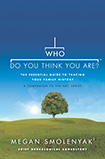Involve the entire family
Smolenyak said researching your family history is a great multigenerational project. Everyone from younger children to their cousins in college to grandparents and even great grandparents can be involved at one time, through e-mail, Facebook, and genealogy website tools. Families can even take a genealogical field trip to an ancestor's hometown to research records in a county courthouse or find clues in a cemetery."It sounds sort of strange, bringing your kids on a hunt in a cemetery," she said. "But a lot of them really get into it. It's neat."
The more people who get involved, the more everyone will learn. "Genealogy is definitely one of those ?the more the merrier' things," Smolenyak said.
The Thrill, and the Surprise, of the Hunt
People often ask Smolenyak, "How long does it take?"
You can spend as much time as you'd like researching your family tree, she said, depending on how much time you want to spend and what you want to discover.
Smolenyak keeps trekking back in her own family's history because it's too interesting not to. She discovered that digging up family history can sometimes reveal stories you may be surprised, and horrified, to know. She actually uncovered a family secret that her great grandfather murdered her great grandmother. Like many ancestry tales from centuries ago, it was "swept under the rug," Smolenyak said.
But Smolenyak turned this finding into a positive thing. "I'm not one to whitewash history," she said. "What I take out of it is not, 'Oh, I have the blood of a murderer' – it's, 'Look how tough grandma [their child] is. Look what she endured.'"
Whether people discover a shocking family secret, an unknown connection to a celebrity, or a cultural background they didn't know they had, the search can be fascinating and addicting. The best part is that anyone can do it – whether you're a professional genealogist or just someone who got hooked by reading or watching Who Do You Think You Are?.
"It's the thrill of the hunt," Smolenyak said. "It's like getting sucked into a mystery novel. Everyone has their own history mystery. The younger you get started, the more you're going to learn."
To learn more about researching your family history read an excerpt of the book Who Do You Think You Are?, and learn what kinds of activities you can incorporate into your classroom. And to find many more activities to use in your classroom, check out our Ancestry and Family Tree Slideshow!






